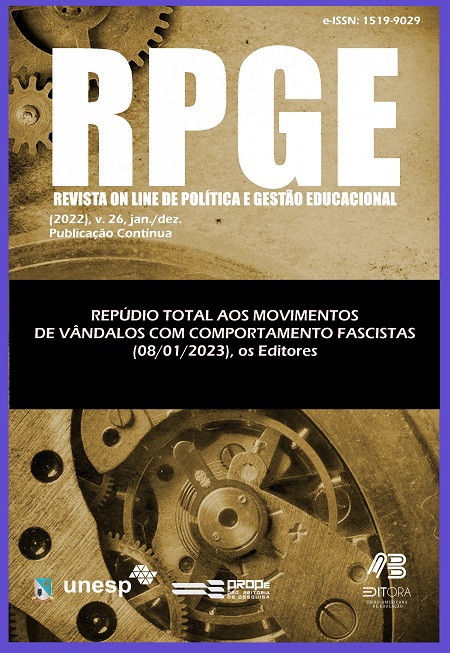Formation of digital communication in the organizational and pedagogical activity of the university
DOI:
https://doi.org/10.22633/rpge.v26i00.17330Keywords:
Digital communication, University digital environment, Educational resources, DigitalizationAbstract
Authors conducted a sociological study with further analysis of the opportunities and threats associated with the introduction of the digital environment at the. The proposed criteria for modeling digitalization are focused on activating the innovative and creative potential of students, scientific and project activity of the teaching staff, as well as on improving professional level of training of personnel and employees of the university, including contributing to personal development and improving labor efficiency. These criteria allow the university brand to take a stable position in a competitive environment and expand the target audience. The introduction of a digital information and communication environment makes the economic development of the university stable, and, as a result, expands the options for partnerships, large-scale scientific and educational projects that give the right to enter the modern socio-cultural space of the country and the world.
Downloads
References
DUDIN, M. N. et al. Situation and problems of digitation of university management in Russia and in three Latin-American countries (Argentina, Chile, and Brazil). Formacion Universitaria, v. 13, n. 6, p. 61-76, 2020. Available in: https://www.elibrary.ru/item.asp?id=45030663. Access in: 20 Jan. 2022.
EVSIKOVA, T. et al. Development of information culture as a key attribute of a modern specialist in the process of training future translators. Revista EntreLinguas, Araraquara, v. 8, n. esp. 1, Mar. 2022. Available in: https://periodicos.fclar.unesp.br/entrelinguas/article/view/16938. Access in: 03 Feb. 2022.
GONCHAROVA, M.; GONCHAROVA, N. Reloading the system of higher education in the conditions of the formation of the digital educational environment in the Russian Federation. Psychological and pedagogical journal Gaudeamus, v. 18, n. 4, 42, p. 7-14, 2019.
HERNÁNDEZ DE VELAZCO, J. J. et al. Relevance and social responsibility of sustainable university organizations: analysis from the perspective of endogenous capacities. Entrepreneurship and Sustainability Issues, v. 7, n. 4, p. 2967-2977, 2020. Available in: https://jssidoi.org/jesi/article/565. Access in: 20 May 2022.
KLIMOV, A. et al. About the Digital Ecosystem of The Modern University. Modern Information Technologies and It Education, v. 15, n. 4, p. 815-824, 2019.
KUZ'MIN, P. Semiotic method for knowing reality: limits of applicability. Bulletin of the Russian university of friendship of peoples. Series: theory of language. Semiotics. Semantics RUDN, v. 10, n. 3, p. 610-621, 2019.
RETS, N. et al. Effectiveness of foreign language teaching techniques: provision of feedback as a way to correct writing mistakes. Revista EntreLinguas, Araraquara, v. 8, n. esp. 1, Mar. 2022. Available in: https://periodicos.fclar.unesp.br/entrelinguas/article/view/16934. Access in: 18 Apr. 2022.
SANCHEZ, J. J.; ALEMAN, E. Teachers’ opinion survey on the use of ICT tools to support attendance-based teaching. Computers & Education, v. 56, n. 3, p. 911-915, Apr. 2011. Available in: https://www.sciencedirect.com/science/article/abs/pii/S036013151000326X. Access in: 02 May 2022.
SLEPOV, V. A. et al. Methodological Approaches to Financing Higher Education Institutions in the Context of Digitalizing the Russian Higher Education. Revista Tempos e Espaços em Educação, v. 14, n. 33, 2021. Available in: https://seer.ufs.br/index.php/revtee/article/view/15928. Access in: 23 Feb. 2022.
USACHEVA, O.; CHERNYAKOV, M. Assessment of the readiness of higher educational institutions for the transition to a digital educational environment. Vysshee obrazovanie v Rossii, v. 29, n. 5, p. 53-62, 2020. Available in: https://vovr.elpub.ru/jour/article/view/2247?locale=en_US. Access in: 13 Oct. 2021.
VAN HEERDEN, D.; GOOSEN, L. Information and Communication Technologies to Change Education. Conference: Proceedings of the South Africa International Conference on Education, 2020. Available in: https://www.researchgate.net/publication/346717946_Information_and_Communication_Technologies_to_Change_Education. Access in: 17 Feb. 2022.
VANYUSHKINA, V. University brand in digital educational environment. Bulletin of the RSEU, n. 4, p. 26-33, 2019.
VDOVINA, M. et al. The impact of digitalization on social and pedagogical work development. Nuances: Estudos sobre Educação, Presidente Prudente, v. 32, e021021, Jan./Dez. 2021. Available in: https://revista.fct.unesp.br/index.php/Nuances/article/view/9209/pdf_1. Access in: 08 Feb. 2022.
ZHAROV, A. N. et al. Impact of the Pandemic on the Learning Process of Foreign Students Studying in Russia and Prospects for Educational Migration. European Journal of Contemporary Education, v. 11, n. 2, p. 582-591, 2022.
Published
How to Cite
Issue
Section
License
Copyright (c) 2022 Revista on line de Política e Gestão Educacional

This work is licensed under a Creative Commons Attribution-NonCommercial-ShareAlike 4.0 International License.
Manuscritos aceitos e publicados são de propriedade da Revista on line de Política e Gestão Educacional. É vedada a submissão integral ou parcial do manuscrito a qualquer outro periódico. A responsabilidade do conteúdo dos artigos é exclusiva dos autores. É vedada a tradução para outro idioma sem a autorização escrita do Editor ouvida a Comissão Editorial Científica.










